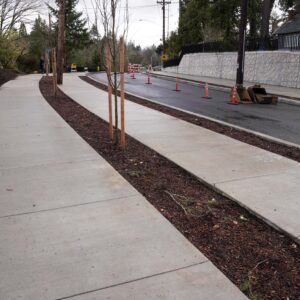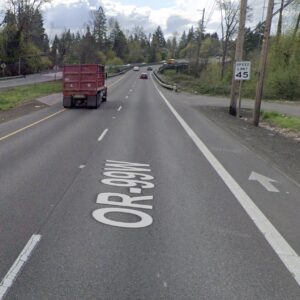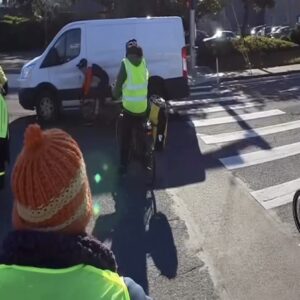Last week I posted about bike lawyer Ray Thomas’ new campaign to take the law into our own hands when in a serious injury crash with a motorist. The advice was great, but it wasn’t very clear to non-lawyers.
What follows below is a more straightforward checklist of what do to after you’ve been hit. It was submitted to me by local cyclist Austin Ramsland.
OK. You find yourself in the middle of the street and you are staring down the bumper of a car. You have just been hit, you are alright, although pretty shook up. Unfortunately, now, when you are probably least capable, you need to start thinking:
1) Do a check. And when you know it is safe to move, get up and get safe. Next, make sure that the driver is stopped and staying stopped.2) Get someone else to call the cops. Everyone has a phone, so get someone else to make the call.
Why this is important: You have some important work to do and if you can get away with not spending 10 minutes on the phone with the emergency dispatch, the better. Also, the stress of the accident might make it impossible for you to actually remember the number. Sounds crazy, but its true.
3) Start some crowd control. Start gathering people and information. (And if you can’t do it, get someone to do it for you.) Tell people not to leave, and tell them what you need. Name, address, phone number of all of the witnesses. Make sure to ask them what they saw, so the story does not change a week later. Take some pictures if you have a cameraphone. Note: It is illegal in Oregon for a witness to bail out without giving you his/her information.
4) Talk to the driver. Get his/her information: Phone, address, insurance information (including policy number), also get his/her license plate and drivers license number. If they are at fault, ask them to admit it.
Why this is important: People change their minds. All the time. Especially when are consequences to their actions and incentives to changing the story.
5) Wait for the cop. This could take a while. Make the driver wait if at all possible. When the cop shows up, he will ask you a couple of very important questions.
“Do you need an ambulance?” This question seems straightforward, but it is not. In Oregon, there are two criteria for a police investigation. One is if there is over $1500 of damage to a vehicle. Two is if there is trauma. Trauma is determined by the ambulance. In other words: No ambulance ride. No investigation. If you are wavering, take the ride.
Why this is important: If the incident is investigated and the driver is a fault, it will be easier to get insurance to pay for any damages. If the accident is not investigated, it is as if it never happened.
“Tell me what happened.” Here is where you lay out the details. If the driver is clearly at fault, say so. If he/she admitted it, say so.
6) Get the officer’s information. Name, badge, everything he/she will give you. Typically, they have cards that they give out.
7) Get the carbon copy of the officer’s exchange of information form. This is a form that the cop has to fill out.
8) Start asking questions:
• Are you going to ticket the driver for [blatant violation]?
• Is this accident going to be investigated? If not, why not?Understand that some cops don’t fully understand your rights to the road, so if you run into a brick wall, don’t worry, you still have some moves to make.
This next bit is the tricky part, but is also very important.
9) Call 503-823-2103 and report the accident. In Oregon, you can call up traffic division and report the incident. Traffic division will assign a staffer to take a report of the accident. You will need the carbon copy of the officer’s report. Once the staffer takes the report, it will be sent to Oregon traffic court. This will turn into an honest to goodness traffic violation if you follow the next steps.
10) Sign the violation. One week later you must show up to traffic court to sign the violation and make it official. A summons will then be sent to the driver to show up at traffic court.
11) Get ready and go to court. Here is where you lay out your case that the driver violated the law. If you win, the driver will be cited with a traffic violation.
Why this is important: With a violation on the books, any insurance company will have a hard time denying who was at fault. It is also important to get these violations on the books, so that policymakers know that people are getting hit, and have to take this action.12) Call the driver’s insurance company and file a claim. If it was a bad accident, get a lawyer. If you don’t know if you need a lawyer, get a lawyer. If you think you can handle it on your own proceed with caution.
13) Know what you are dealing with and put on the gloves. The insurance person who calls you is working a crappy job. They have to listen to stories like yours all day long, and chances are that their bosses are giving them a hard time about something. It’s not their fault, but they do not care about you. They care about costs, current and future liability, and their job. When they are on the phone with you, they are probably looking at all three.
14) Start fighting your case. Some people call this negotiation, but the fact is that you need to let them know that you mean business and that you are open to an offer. Cite the violation. Cite the witnesses. Cite the driver. Say how you could have died. If they give you a number, ask for double. If they ask you to release them of any further liability, say no. If they capitulate, be suspicious. Take the hard line.
Why this is important: All bets are off when dealing with insurance companies. They weren’t in the accident, and they didn’t see the accident. All they are looking at is their liability and their bottom line. Remember that this is very emotional for you, but also remember that this is just another day at work for them. Note: Don’t expect this to wrap up with the first, second, or third call. They know that you will likely get frustrated and give up. Don’t. Give. Up.
15) Accept an offer. When you think you have a good offer, accept. But make sure that you review the terms before signing anything.
16) Congratulate yourself. If you got to this step, then you are one of the very few riders that got compensated for an accident. Now, take a couple of deep cleansing breaths, put the ordeal behind you, and go for a ride.
Thanks for sharing this with us Austin. I think the next step is to fit this onto a card that can fit in our wallets…anyone out there want to help with that?







Thanks for reading.
BikePortland has served this community with independent community journalism since 2005. We rely on subscriptions from readers like you to survive. Your financial support is vital in keeping this valuable resource alive and well.
Please subscribe today to strengthen and expand our work.
I would say that #2, after “Get Safe” should be, make sure to get the driver’s license plate number. One time I was hit and I had gotten myself and my bike off the roadway, and not even had time to assess the damage before the bastard drove off. Fortunately, I had the presence of mind to get his license plate number, and was able to get the jerk to pay for my new front wheel (which he had taco’ed, it turned out).
How about laying it all out and using
http://www.pocketmod.com/
to create a quick little print-fold-cut booklet?
Or, at least borrow thier folding method and lay out all the steps in the right grid and orietation so it works like pocketmod?
Great advice to post. And absolutely correct with regard to the fact that if there is no investigation, it basically never happened. As a victim of a hit-and-run driver in Washington, with two witnesses who refused to provide their information, I can tell you that a license number and make/model of car in a police report will get you precisely nothing. Best of luck to anyone who does get hit with regard to health and restitution.
While this is great advice for a actual injury accident, or a accident where things have stopped.
But, as far as practical for the bicyclist on the road, It is too much info, and, unles someone has a outline in their pocket, is going to be impossible to follow, except for the couple of points you may remember.
I was hit right before the new year, was so frazzled that the truck took off. I got no witness statements, I didn’t call the police(they never would have shown up anyway).
I finally tracked the truck down like a half hour later, wrote down the info off the truck.
After contacting the company, with no legally usable info or police report. I got paid.
Even when you do things wrong in the investigation of a accident, if you did nothing wrong, you can win.
I only wanted the money for my parts and clothing.
They gave me that, and then offered me a job because of how I dealt with the situation, is what they said.
You can win.
You will win. There is no one who is going to let you get screwed, because you are looking out for what is right.
This is the attitude that will get you paid.
The police can help, witnesses can help.
But the police and witnesses will mainly favor the side of the driver, because to most, the actions of a bicyclist on the street are foreign to them, so must be in the wrong.
Attitude, attitude, attitude. PM………….A!
Thanks for that input Dabby. And eric, thanks for the tip about PocketMod. I looked into it and it doesn’t seem too easy to import your own text…but I’ll keep trying.
A local guy said he wants to make this into spoke cards and I’ve also had a graphic designer email me offering to…so stay tuned.
I don’t know about you, but if I’m out on a ride there’s a slim chance that I’ll have anything readily available to write with/on for license info. How about packaging this card with paper and a small pen/pencil that attaches easily to the bike in a waterproof container of some kind?
Looks like there’s a PDF-to-pocketmod converter here: http://www.pocketmod.com/files/PDFtoPocketMod.zip.
Once you’re in PDF you’re good to go. This can be done either with Adobe Acrobat, or by creating a document in Word or OpenOffice and using the opensource PDFCreator to get to PDF.
Someone emailed me directly with a completed version of the checklist using PocketMod. I printed it out and folded it and it works great. I’ll post some photos asap. Thanks for all the feedback and help.
NOTE: some of us are working on a postcard to give to motorists, one which sums up cyclists rights and selected rules of the road (about opening car doors, passing, etc.) I think the text on the card is getting fairly full, but there will also be a link to a webpage (probably on Shift site) where more info can be found. Maybe this could be incorporated, or related. There is some funding, nad we even have free printing available. One card for motorists, one for cyclists? Anyone want to get in on this effort? Post here if you’re interested?
well i was just hit by a big truck 2 days ago. the ambulance came they took me to the hospital, i was lucky, i get hit on my head by the fall,have black bruises on my behind ,and a swallowed hand,but nothing too serious, so i was discharged from the hospital. well after two days i feel very weird , my whole body hurts, my muscles and i feel dizzzy the whole day. i dont know what to do. ..
i have to check back in the hospital again, to check up. but as per insurance and other stuff goes i dont know where to go…
I was hit earlier this week (the driver should be entirely liable) but was in such a state that I convinced myself I was okay. The guy stuck around and I am working on getting his insurance information. However, no police report was made. Bills aren’t huge but there are some medical ones and my bike needs a bit of work plus a new helmet. I know I should be able to get some out of this but I’m not sure what my options are now that a report wasn’t filed but that I will have their info and have at least one witness. Any advice would be greatly appreciated.